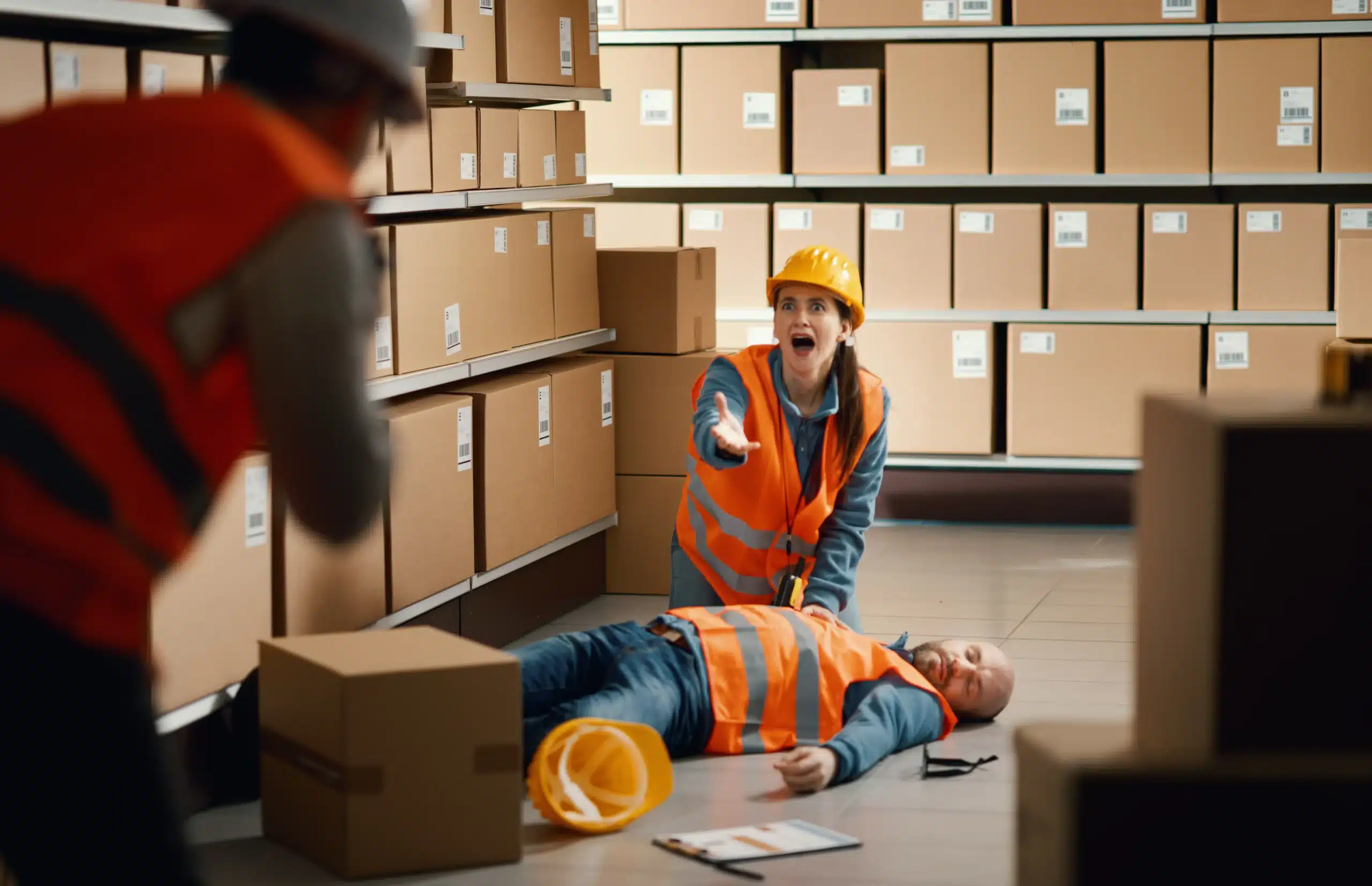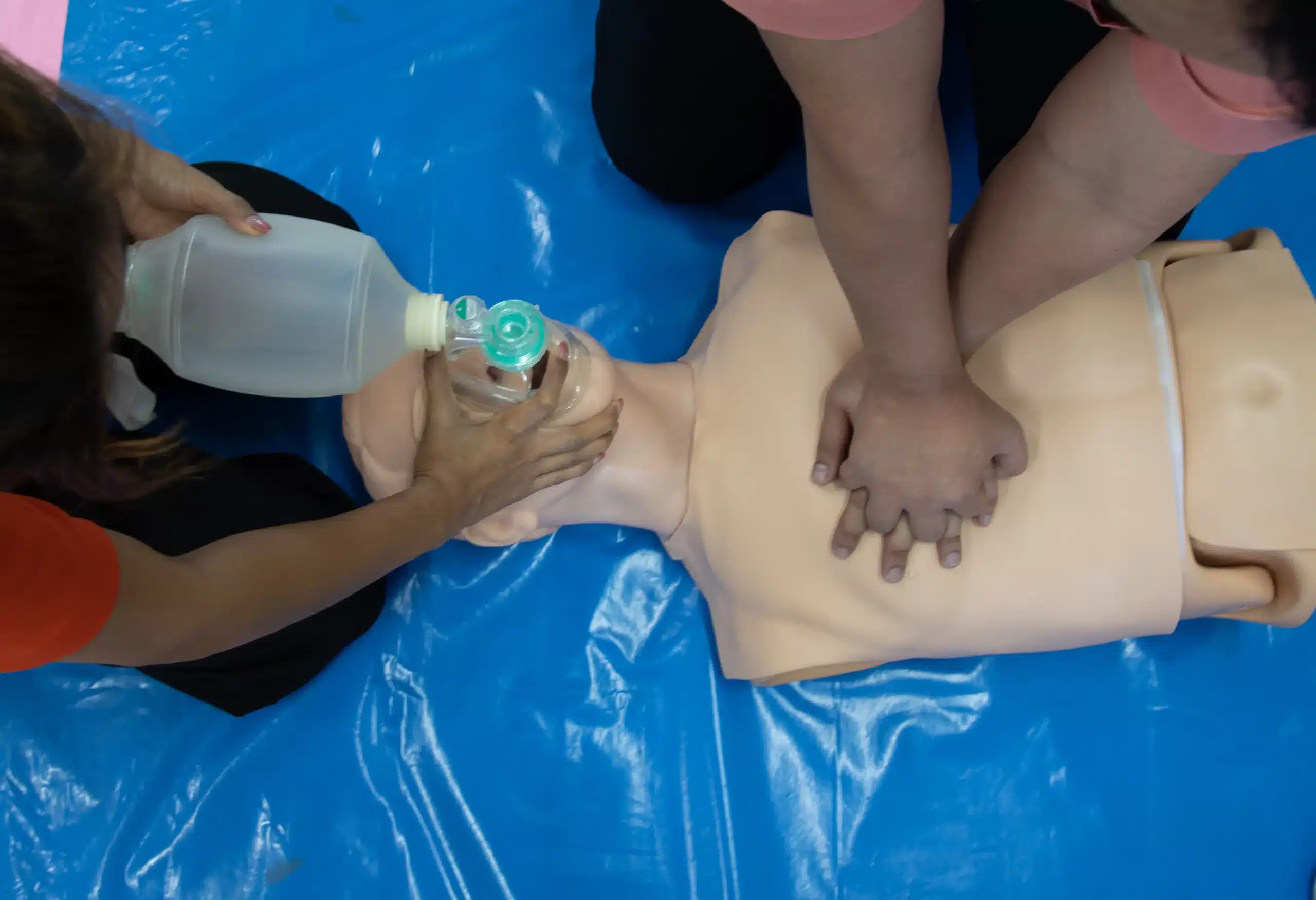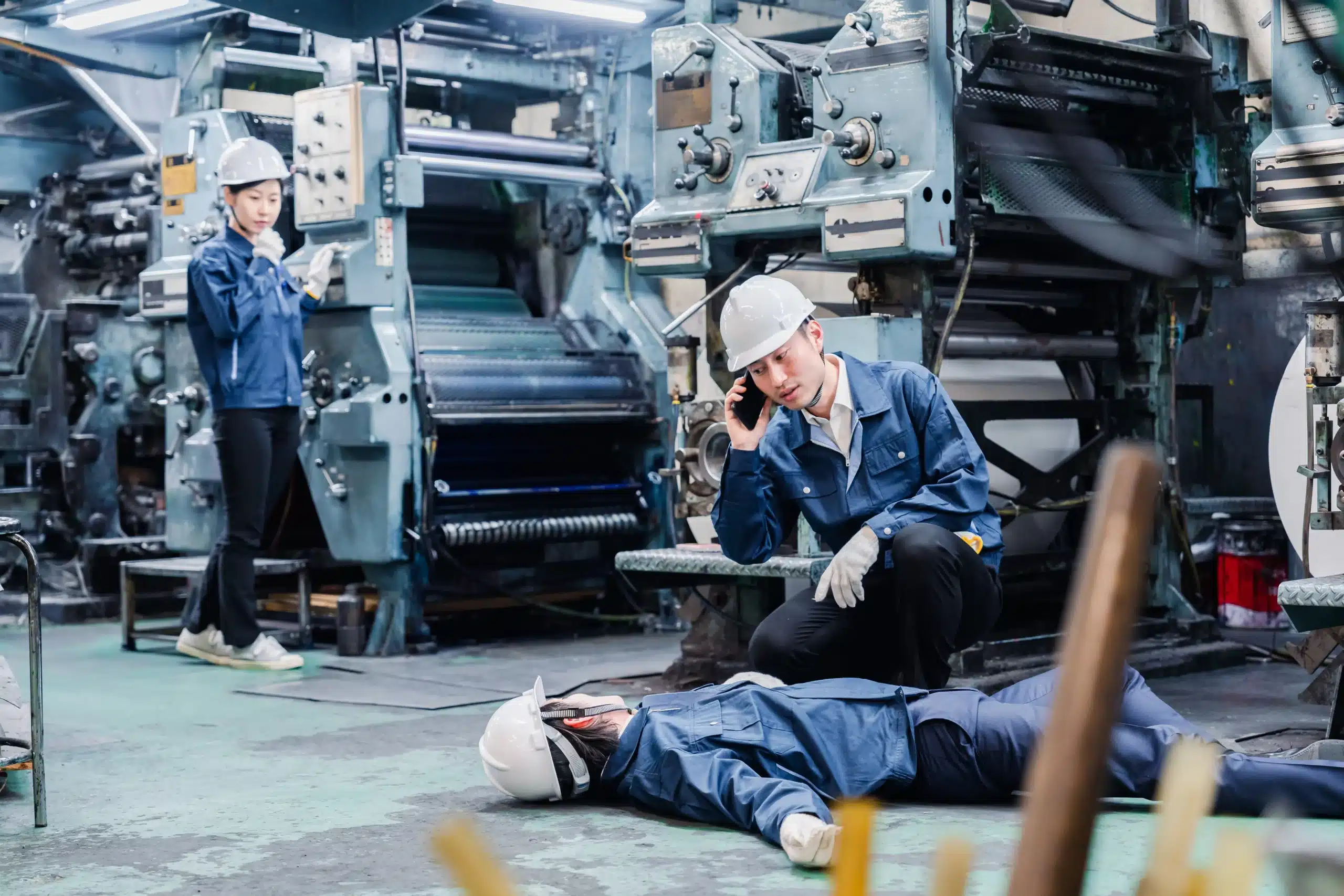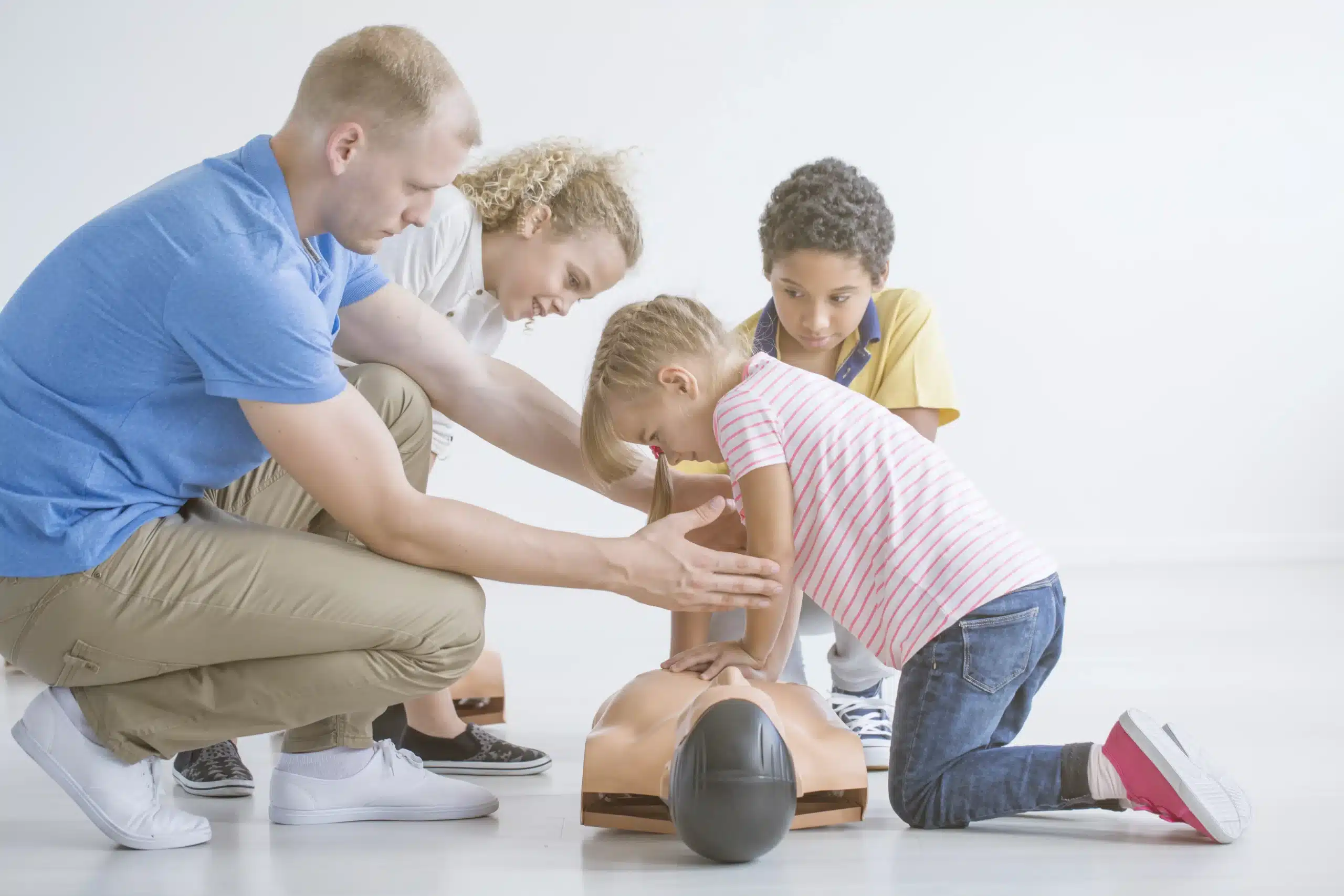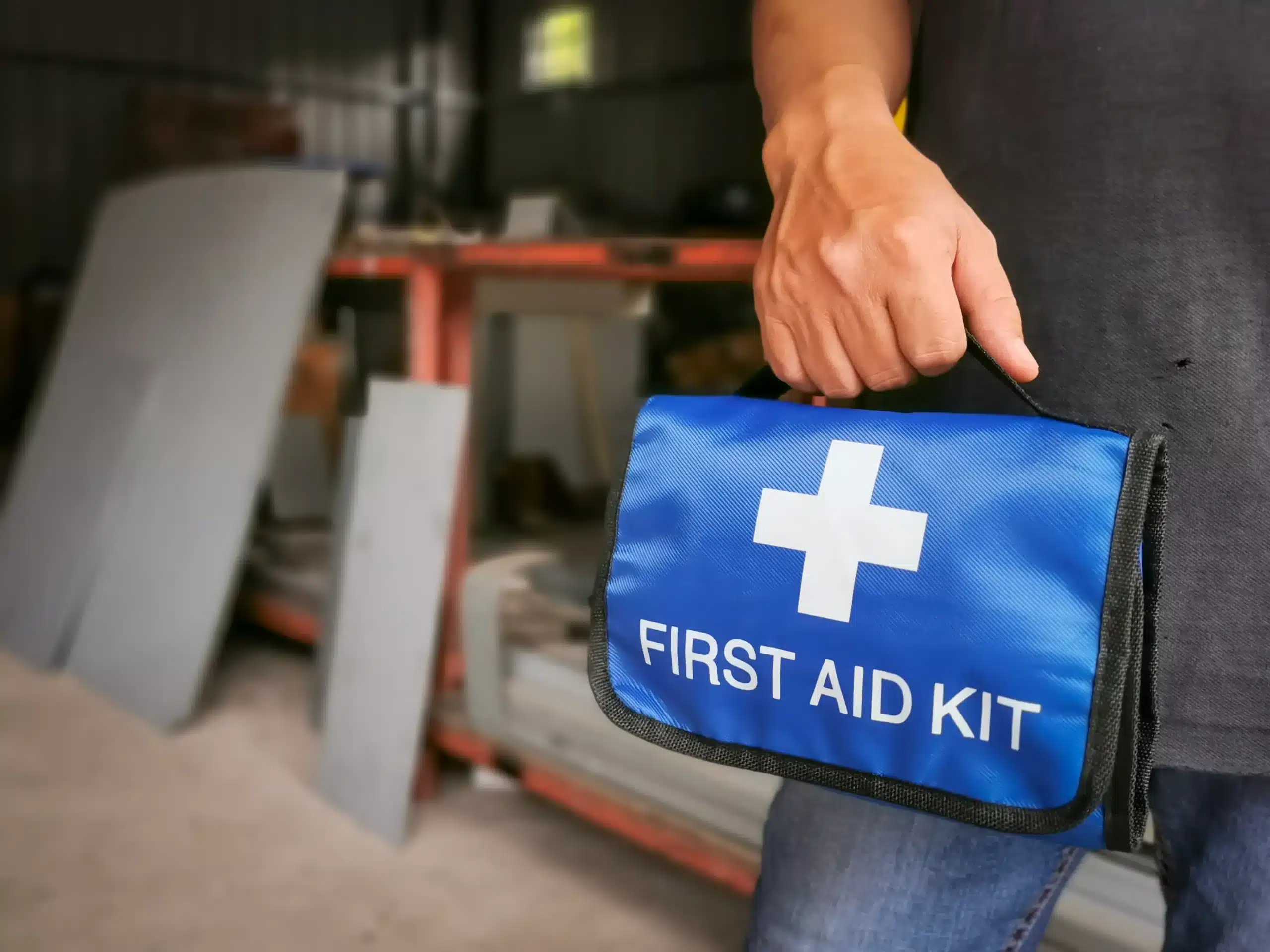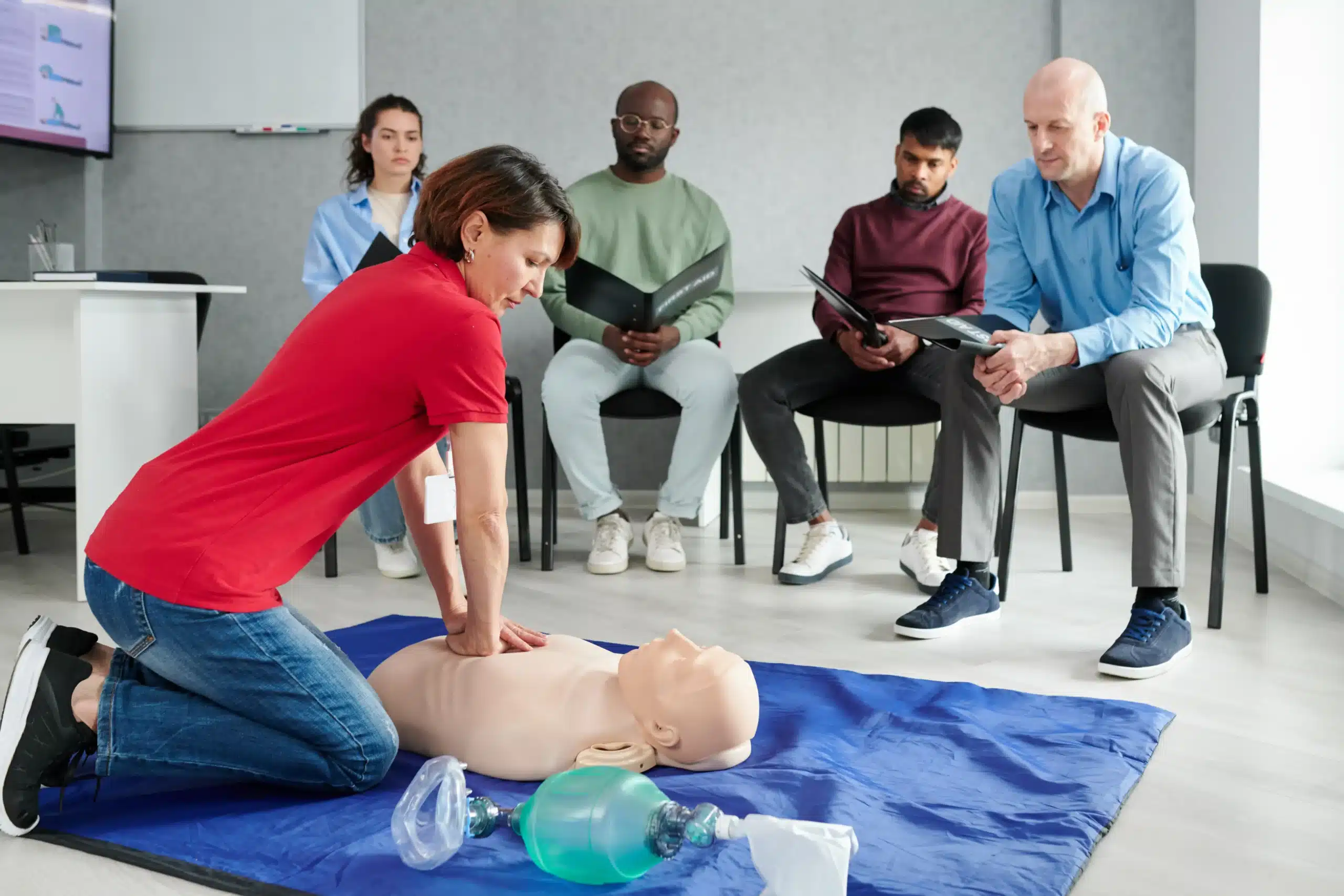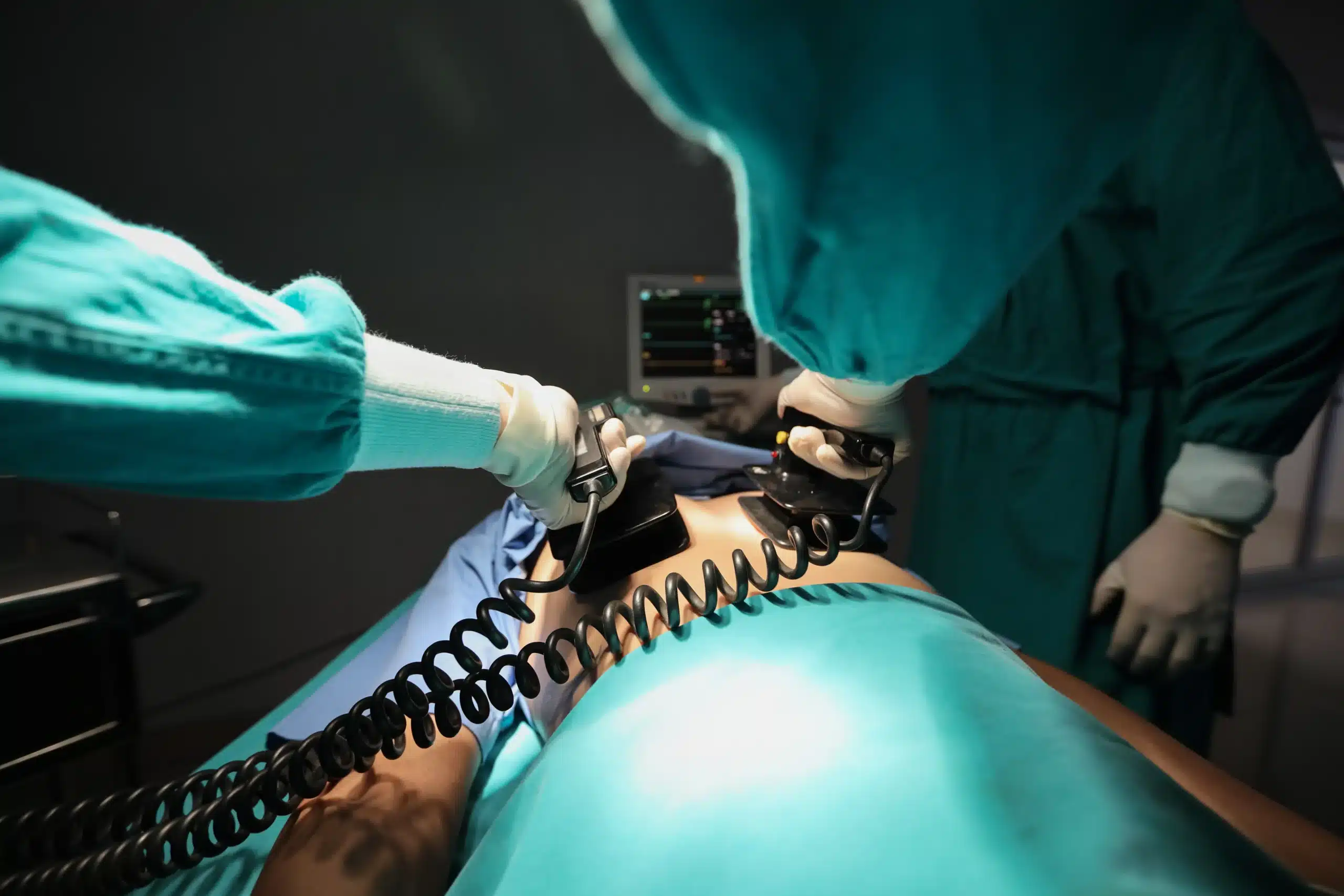Accidents happen, especially with children. Being prepared is key to ensuring their safety. This guide is your go-to resource for understanding pediatric CPR and first-aid in Sunnyvale. We’ll cover why these skills are so important, the specific techniques you’ll learn in a certification course, and how to find the right class for you. From understanding the costs and value of certification to exploring different class formats and instructor qualifications, we’ll equip you with the knowledge to make informed decisions about pediatric CPR and first-aid training in Sunnyvale.
Key Takeaways
- Be prepared for emergencies involving children: Learning pediatric CPR and first aid empowers you to respond effectively to various situations, from minor injuries to life-threatening events. Find a local class covering infant and child CPR, choking procedures, and basic first aid.
- Choose a course that suits your needs: Consider factors like in-person vs. blended learning formats, instructor experience, and scheduling options. Look for providers offering weekend or evening classes and convenient locations. Don’t forget to compare costs and explore potential discounts.
- Invest in your skills and your community: Becoming certified in pediatric CPR and first aid benefits not only the children in your care but also contributes to a safer environment for everyone. Maintain your skills by renewing your certification every two years and staying informed about the latest guidelines.
What is Pediatric CPR and First-Aid?
Pediatric CPR and First-Aid classes teach you how to handle emergencies involving children. These classes cover techniques specifically for infants and children, including CPR, managing choking, and providing first aid for common injuries. Knowing how to assess a child’s condition and react quickly can be life-saving. Pediatric First-Aid training empowers you to provide immediate care in those critical moments before professional help arrives. The American Heart Association offers various certification courses, including the Heartsaver Pediatric First Aid CPR AED course, designed for childcare providers and anyone responsible for children’s safety. This training is crucial for parents, caregivers, and childcare providers to respond effectively in emergencies.
Why Learn Pediatric CPR and First-Aid?
Learning Pediatric CPR and First-Aid is essential for anyone responsible for a child’s well-being. Kids are naturally curious and active, which means bumps, bruises, and unexpected situations are bound to happen. Knowing how to respond quickly and effectively can make all the difference. Early CPR can significantly improve the odds of survival during cardiac arrest. In fact, according to the American CPR Care Association, those odds increase dramatically when CPR begins within the first two minutes. This information underscores how critical timely intervention can be in a crisis. Learn more about CPR certification.
Beyond CPR, understanding basic first-aid is equally important. Knowing how to treat common childhood injuries like cuts, burns, or allergic reactions can prevent complications and keep a child safe until professional medical help arrives. It’s all about having the tools to handle a range of situations, from minor scrapes to more serious events.
For new parents and caregivers, taking an infant CPR class is especially crucial. Ideally, this training happens before the baby arrives or very soon after. These classes focus on the specific techniques for addressing breathing and choking emergencies in infants, providing parents with confidence and peace of mind. Consider a course like the Heartsaver Pediatric First Aid CPR AED, offered by the American Heart Association. It’s designed specifically for childcare providers and anyone responsible for children’s safety, making it a valuable resource for parents and caregivers. You can find more information on Pediatric CPR and First-Aid classes in Sunnyvale. Learning these vital skills prepares you for emergencies and contributes to a safer environment for all children.
Pediatric CPR and First-Aid Classes in Sunnyvale
Finding the right pediatric CPR and first-aid class can feel overwhelming. Fortunately, several excellent resources are available in Sunnyvale and the surrounding areas. This section highlights some prominent options to help you make an informed decision.
Sunnyvale CPR Classes
Sunnyvale CPR Classes, offered by Safety Training Seminars, makes high-quality training accessible with affordable and convenient options. They focus on empowering individuals to respond confidently during medical emergencies.
Safety Training Seminars
Safety Training Seminars provides a comprehensive range of American Heart Association (AHA) certified courses, including CPR, Basic Life Support (BLS), Advanced Cardiovascular Life Support (ACLS), and Pediatric Advanced Life Support (PALS). Check out their website for information on group discounts, which can be a cost-effective option for families, community groups, or workplaces.
In Home CPR
If you’re looking for a more personalized approach, In Home CPR brings the training directly to you. Their team of EMTs, paramedics, and medical students travel to your home or business in Sunnyvale to deliver certification courses in CPR, First Aid, BLS for Healthcare Providers, and ACLS.
Bay Area CPR
Safety Training Seminars also operates through Bay Area CPR, offering convenient access to AHA-certified BLS, ACLS, PALS, and CPR classes in Sunnyvale. This location serves the surrounding cities of Palo Alto and Santa Clara as well.
American Red Cross
The American Red Cross, a nationally recognized organization, provides CPR and first-aid training throughout the country. They offer CPR/AED classes in California led by expert instructors who equip participants with essential lifesaving skills and the confidence to respond effectively in emergencies.
Stanford Health Care
Stanford Health Care may offer pediatric CPR and first-aid classes. Visit their website or contact them directly for the latest information on course availability and schedules.
El Camino Health
El Camino Health is another potential resource for pediatric CPR and first-aid training in the area. Check their website or contact them for details about their programs.
Class Formats and Instructors
Finding the right pediatric CPR and first-aid class involves understanding different learning formats, instructor qualifications, and scheduling options. Let’s break down what you should look for in Sunnyvale.
In-person vs. Blended Learning
Balancing your schedule with learning new skills can be tricky. Luckily, there are options to fit your needs. Blended learning courses, like the American Heart Association (AHA) Heartsaver® CPR/AED Blended Learning course, combine online coursework with a shorter in-person skills session. This format offers flexibility for busy parents and caregivers. If you prefer a fully hands-on experience, traditional in-person classes are also readily available through providers like Safety Training Seminars.
Instructor Qualifications
When choosing a class, consider the instructors’ credentials. Experienced instructors, such as EMTs, paramedics, or medical students, bring real-world knowledge to the classroom. In Home CPR highlights the expertise of their instructors, who travel to your home or business in Sunnyvale. Regardless of the provider, confirm that instructors hold current certifications and have experience teaching pediatric CPR and first-aid. Safety Training Seminars focuses on providing qualified instructors for a range of courses, ensuring participants receive high-quality training.
Scheduling
Flexibility is key when scheduling. Look for providers that offer classes on various days and times. Safety Training Seminars makes it easy to view their course schedule and register online. For maximum convenience, some providers, like Bay Area CPR, offer classes seven days a week and can even come to your location. This makes it easier to fit training into your busy schedule.
Key Skills in Pediatric CPR & First-Aid
This section covers the essential skills you’ll learn in a pediatric CPR and first-aid class. These skills empower you to respond effectively to various emergencies involving infants and children.
Infant CPR
Infant CPR addresses the unique needs of babies under one year old. You’ll learn how to assess an unresponsive infant, deliver gentle chest compressions, and provide rescue breaths. Timing is critical with infant CPR. Starting CPR within the first two minutes of a breathing emergency drastically increases the chances of successful resuscitation. Taking an infant CPR class is a worthwhile investment for any parent or caregiver, ideally before your baby arrives or shortly after birth. Learning these skills provides confidence and preparedness for emergency situations.
Child CPR
Child CPR focuses on children over one year old who are not yet adolescents. Similar to infant CPR, you’ll learn to assess responsiveness, perform chest compressions, and give rescue breaths. However, the techniques differ slightly to accommodate a child’s larger size and developing physiology. Even young children can learn and perform effective CPR, highlighting the accessibility and importance of this life-saving skill. Early intervention with CPR significantly improves a child’s chance of survival during cardiac arrest.
Choking
Choking is a common hazard, especially for infants and young children as they explore the world. Babies between six and twelve months are particularly vulnerable as they begin exploring objects with their mouths and trying solid foods. A pediatric first-aid and CPR course teaches you how to recognize the signs of choking and perform techniques to dislodge the obstruction. You’ll learn back blows and chest thrusts for infants, and abdominal thrusts (the Heimlich maneuver) for older children.
Wound Care
Wound care is a fundamental component of pediatric first aid. You’ll learn how to clean and dress minor cuts, scrapes, and burns. The class also covers how to recognize signs of infection and when to seek further medical attention. Safety Training Seminars offers various first-aid training options in Sunnyvale, from basic wound care to more advanced techniques.
Emergency Assessment
Developing the ability to quickly and accurately assess an emergency is crucial for providing effective care. Pediatric first-aid and CPR training teaches you to recognize the signs and symptoms of various medical emergencies, such as allergic reactions, seizures, and heatstroke. You’ll learn how to prioritize care and when to call 911. Take a pediatric first-aid and CPR course to gain the confidence and competence to handle emergencies involving children.
Benefits for Parents & Caregivers
Knowing pediatric CPR and first aid can make all the difference if a child in your care experiences a medical emergency. These skills empower you to act quickly and confidently when it matters most. Let’s explore why these skills are so valuable:
Be Prepared in Emergencies
Emergencies involving children can happen anytime. A child could choke on a small toy, experience a sudden allergic reaction, or suffer a fall. Pediatric first-aid and CPR training equips you to respond effectively in these critical situations. Instead of feeling helpless, you’ll have the knowledge and skills to assess the situation, provide immediate care, and potentially save a life. As the experts at Boober point out, taking an infant CPR class is crucial for parents, ideally before the baby is even born.
Save Lives
In a medical emergency, every second counts. CPR, especially if started within the first two minutes, drastically increases the chances of survival. Boober highlights that early CPR can lead to a successful resuscitation rate of around 85%. Learning pediatric CPR equips you with the potential to save a child’s life. This rapid response can be the bridge to survival until professional medical help arrives.
Stay Calm in Crises
Emergencies are stressful, and it’s easy to panic when a child is involved. However, CPR and first-aid training provides more than just practical skills; it instills confidence. Knowing what to do helps you stay calm and focused, allowing you to make clear-headed decisions under pressure. This calmness can be reassuring for the child and anyone else present, creating a more controlled and effective response. Sunnyvale CPR classes are designed to build this confidence, ensuring you leave feeling prepared to handle emergencies.
Community Safety
Learning pediatric CPR and first aid isn’t just about protecting the children in your immediate care; it’s about contributing to a safer community. When more people possess these skills, we create a network of support where anyone can step in during an emergency. Safety Training Seminars offers various courses suitable for everyone—parents, teachers, coaches, and anyone interested in learning these lifesaving skills. By becoming trained, you become a valuable asset in your community, ready to assist in times of need.
Costs and Value
Knowing the price range for Pediatric CPR and First-Aid training helps you budget and compare options to find the best value. This section breaks down typical costs, potential discounts, and the value of your certification.
Class Pricing
Pediatric CPR and First-Aid classes in Sunnyvale typically range from $70 to $100, depending on the provider and course content. Factors influencing price can include the course length, the materials provided, and the instructor’s expertise. Sunnyvale CPR Classes is known for its competitive pricing, so check their website for current rates.
Discounts
Look for discounts that can make these essential skills more accessible. Many training providers, including the American Heart Association and local community centers, offer discounts for group registrations. This can be a great option for families, community groups, or workplaces wanting to train multiple people. Contact Sunnyvale CPR Classes to ask about group discounts.
Certification
You’ll receive a certification card valid for two years upon completing a Pediatric CPR and First-Aid course. This card demonstrates your proficiency in these crucial skills, essential for parents, caregivers, and anyone working with children. It provides peace of mind and shows your commitment to children’s safety. Remember to renew your certification every two years to stay current and maintain your skills.
Choose the Right Class
Finding the right pediatric CPR and first-aid class takes a little research, but it’s worth it to ensure you receive quality training. Here’s how to choose the best class for you:
Assess Your Needs
Before searching for classes, consider why you want to learn pediatric CPR and first aid. Are you a parent, babysitter, teacher, or healthcare professional? Different professions and personal situations may require different certifications. For example, healthcare providers often need BLS certification, while a basic CPR and first-aid course might be enough for parents. Safety Training Seminars offers a range of American Heart Association (AHA) certified courses, so you can find one tailored to your needs. If you’re unsure which class is right for you, contact a provider like Safety Training Seminars for guidance.
Compare Providers
Once you know the type of class you need, compare different providers in your area. Consider class schedules, location, and cost. Some providers offer weekend or evening classes, helpful for busy schedules. Also, check if the provider offers in-person classes or blended learning that combines online learning with in-person skills practice. CPR training in Sunnyvale has a variety of options to suit different learning styles. Compare pricing and look for discounts, such as those for group classes at Safety Training Seminars.
Check Reviews
Finally, read reviews and testimonials from previous students. Websites like Yelp offer insights into the quality of instruction and the overall learning experience. Look for comments about instructors’ expertise, the clarity of materials, and staff helpfulness. Reviews can give you a sense of what to expect and help you make a smart decision. You can also find information about CPR classes offered by Safety Training Seminars and read program reviews. Choosing a reputable provider with experienced instructors ensures you receive high-quality training and feel confident responding to emergencies.
Enroll in a Class
Ready to learn life-saving skills? Enrolling in a pediatric CPR and first-aid class is straightforward. Here’s what you can expect:
Register
Finding the right class is the first step. Safety Training Seminars offers a variety of American Heart Association (AHA) certified courses, including CPR, Basic Life Support (BLS), Advanced Cardiovascular Life Support (ACLS), and Pediatric Advanced Life Support (PALS). We also offer group discounts for families, businesses, or community groups. Browse our course schedule and select a date and time that works for you. Many CPR training providers in Sunnyvale offer similar courses, so compare options to find the best fit.
Prepare
Once registered, it’s time to prepare for your class. Some courses, like the AHA Heartsaver® CPR/AED Blended Learning course, combine online learning with an in-person skills session. This lets you learn the basics at your own pace before practicing hands-on skills with an instructor. The blended learning option is often priced around $65 in Sunnyvale. Check with your chosen provider for specific requirements and any materials you might need beforehand.
Post-Certification Resources
After completing your CPR course with Safety Training Seminars, you’ll receive an American Heart Association (AHA) certification card, valid for two years. But your learning journey doesn’t end there. Stay up-to-date on the latest guidelines and best practices by exploring resources like the American Heart Association website. Consider refreshing your skills with a renewal course before your certification expires. Safety Training Seminars offers a variety of AHA-certified classes, including CPR, BLS, ACLS, PALS, and First Aid. We’re here to support you in maintaining your skills and confidence in emergency situations.
Related Articles
- CPR Certification in San Jose: A Practical Guide – Sunnyvale CPR Classes
- Why CPR is Crucial in Healthcare
- CPR Courses in Sunnyvale: Your Ultimate Guide – Sunnyvale CPR Classes
- CPR Certification in Santa Clara: Your Guide – Sunnyvale CPR Classes
- First-Aid Training in Sunnyvale: Your Guide – Sunnyvale CPR Classes
Frequently Asked Questions
What’s the difference between infant and child CPR?
Infant CPR is specifically designed for babies under one year old, using gentler techniques and different hand placements for chest compressions compared to child CPR, which is for kids over one year old. The methods for checking responsiveness and giving rescue breaths also have slight variations.
How often do I need to renew my CPR certification?
CPR certifications are typically valid for two years. Renewing your certification ensures you stay up-to-date with the latest guidelines and maintain the skills and confidence to respond effectively in an emergency.
What if I can’t afford a CPR class?
Many organizations and training centers offer discounts, sometimes for group registrations, making classes more affordable. Check with local community centers, hospitals, or your workplace to see if they offer discounted or subsidized training.
Are online-only CPR courses sufficient?
While online courses offer valuable knowledge, a blended learning format or in-person class is generally recommended. Hands-on practice with a certified instructor is crucial for mastering the physical skills and techniques of CPR.
How do I choose the right CPR class for me?
Consider your specific needs and responsibilities. Parents might choose a basic pediatric CPR and first-aid course, while healthcare providers often require more advanced certifications like BLS. Compare different providers, check reviews, and consider factors like class schedules, location, and cost to find the best fit.
